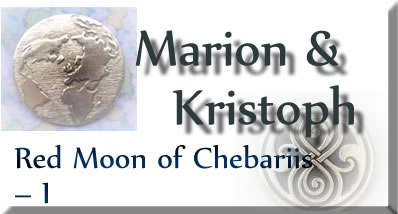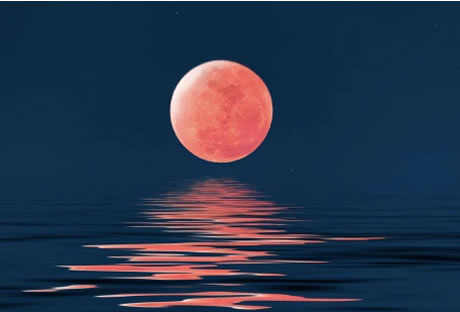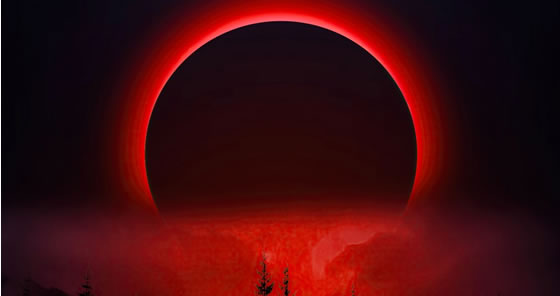

“There was a red moon over Gallifrey once,” Kristoph said as he looked up admiringly at the famous moon of Chebariis. “It broke up several millennia ago due to tectonic instability.”
“Before Gallifrey was inhabited?” Marion asked.
“No, there was already an advanced society. We go back a long way, we Time Lords. The disaster was predicted, and precautions taken. The southern continent was badly affected. Forested areas were hit by burning fragments and lost. Most never regrew and we now have the vast grass plains with scattered monoliths and unexpected crater lakes as a legacy. The original Mount Lœng House was destroyed. Our home is much newer.”
“I never knew about that. Not just the house, but the history of the moon breaking up.”
“I think most modern Gallifreyans don’t worry about it. I only really know because there is a painting in the Celestial Intervention Agency director’s office of Gallifrey as seen from the surface of the red moon. It mirrors one in the Great Gallery showing the moon from Gallifrey. Most casual visitors think it is just an imaginative view, but experts point out details that prove its contemporaneity. Either way, the artist used a lot of rust-red shades of paint on the two pictures.”
“Gallifrey is made of red rock isn’t it?” Marion asked. “Hence the Red Desert.”
“It is, which proves that the red moon was made of the same substance when the planets of our system first cooled. Our smaller, brighter, silver moon was an extra-system asteroid that got caught up in our gravitational field and slipped into a stable orbit.”
“I like the silver moon. It’s the one thing in the sky that’s a bit like on Earth, but it would have been nice to see a red moon. Was it as big as this one?”
“Judging by the painting and contemporary records, much smaller than this Chebariis moon, but about a quarter bigger in circumference than Earth’s satellite. Of course, as my father would quickly correct us both, the perception of size depends not just on the actual dimensions of the moon but how close the orbit is to the bit of planet you’re standing on. This one is a much closer orbit to either Earth or Gallifrey, but it is also larger in real terms.”
Which, as the senior Lord de Lœngb?rrow would have enthusiastically explained, whether in real size or relative perspective the Red Moon of Chebariis appeared as a huge sphere, covering nearly a quarter of the eastern hemisphere and giving a wine-red hue to the sea they were crossing in a VIP hoveryacht. As honoured guests of the Voivode of Chebariis this was very much a privilege that they appreciated, being given a chance of unrivalled views of tonight’s lunar eclipse.
Yes, a lunar eclipse. As big as the moon was, the planet was even bigger and once every fifteen years, it passed between the moon and the sun of its solar system. The phenomenon would be seen all over the eastern hemisphere, but the best view was out on the Eastern Ocean, far from obscuring land masses and light pollution. Anyone with a boat was free to travel so long as they avoided major shipping lanes, but the Voivode’s yacht promised an unrivalled view, full buffet menu and a string quartet playing music written especially for the occasion as well as a chance to make some useful diplomatic friendships into the bargain.
That was the main reason for the visit to Chebariis, of course. It was the fourth such visit in as many weeks. Malika Dúccesci had sent his most trusted ambassadors to make contact with governments with which Gallifrey could enjoy trade and diplomatic links. Chebariis had only made contact beyond its own solar system fifty years ago. It had only a few trade agreements, yet, and they were only with relatively close neighbours.
The Primex of Astria, a fellow eclipse-watcher this evening, had described Chebariis as a ‘pluv-fruit ripe for picking’. A pluv-fruit was, apparently, something like a fig, but very much juicier, as Marion discovered when she asked. Out of diplomatic earshot Kristoph told her that he didn’t see Chebariis as any kind of fruit. The expression smacked too much of exploitation. He wanted to seek fair terms for the metal ores from Chebariisian mines.
Marion understood about that. Gallifrey produced a lot of gold, silver and diamonds, which was very nice in its way, but very little iron, copper and other useful metals. Chebariis was rich in those ores and happy to accept diamonds, a universally accepted currency, as payment.
There was, perhaps surprisingly, a lot of competition for those concessions. As well as the Primax of Astria, Ambassadors from both Quadrix Minor and Quadrix Major, each intending to outbid the other, and the youngest son of the Emperor of Sagua X were hoping to trade with Chebariis. And it did seem as if there would be winners and losers when it came to the negotiations. The government of Chebariis had set strict limits on just how much of the planet’s natural resources could be exported offworld and at least two of the plenipotentiaries might be returning to their planets empty-handed. Kristoph was quite confident that Gallifrey would not be one of the losers, their terms being generous enough, but the others might have to fight it out over the negotiating table.
Prince Andreas of Sagua didn’t seem to want to wait until the negotiations that would begin tomorrow afternoon. He had the ear of the Voivode for nearly the whole of the journey, talking about the deal he hoped to make. The Voivode, for his part, insisted that nothing could be agreed, yet. Tonight was a social occasion, and no decisions could be made until every offer had been outlined.
“The Voivode is being incredibly patient with him,” Marion noted as she helped herself to some very delicious seafood in flaky pastry cases at the buffet, an action that would once have terrified her. The pastry was very flaky, and she would have been mortified to get crumbs all over her clothes when she first began her life as a diplomat’s wife. Now she was far more experienced at handling awkward finger food, as well as using a sotto-voce tone when speaking of other guests without being overheard.
“Very patient,” agreed the Voivode’s wife with a conspiratorial smile. “He was coached most of his life to take the title from his father and lead our world into galactic eminence.”
“That must have been a great burden on him as a boy,” Marion remarked. “To have such a destiny ahead of him.”
“It was,” the Voivodress, as she was styled agreed. “A burden and an honour, of course. As it was for me. I was groomed from birth to be his wife.”
Marion must have let her surprise at that appear momentarily on her face. The Voivodress laughed softly.
“Yes, it was as much of a revelation to me learning that such matches are unusual on other worlds. But I can assure you I was not under any duress. Jured and I learnt to be friends from when we were barely walking. By the time the betrothal was solemnised we were quite inseparable. It is a good, fulfilling life and I have no regrets.”
“I am glad to hear that,” Marion assured her. “And I apologise for any judgements that were in my head. As a diplomat’s wife I should be aware that customs and traditions are as infinitely variable as the worlds in the galaxy.”
“We are only just learning that on Chebariis,” replied Katalvak, as the Voivodress was named at the same infant ceremony where she was paired with the future voivode. “We only began to have offworld contact in my parent’s time. This is all very new to us. It is important that Jured makes the right decisions in the next few days.” For a moment there was an anxious look on the Voivodress’s face. Marion realised that there might be more than favourable trade terms at stake. Could the Voivode’s position as leader depend on these talks? Time Lord information about Chebariis was that it was a stable society. But perhaps that wasn’t quite correct.
“I know we’re not exactly neutral parties, here. Kristoph wants to make a good deal for Gallifrey. But your husband could do worse than to trust his advice. He’s a good man, and a fair one. And he could be a good friend to the Voivode and to your world.”
“My thanks for that,” the Voivodress answered. “I feel the truth of your words. I will advise my husband accordingly.”
There was a curious formality to her last words, as if the Voivodress had realised she had digressed from strict protocol. Marion was a little disappointed. She had liked talking to her. But that was often how it was in aristocratic circles. The spouses had a role to play as well as the ambassadors and sometimes it was just as arduous.
The boat was anchoring in the chosen place, now. The riding lights of smaller boats could be seen close by, though not too close, not even the one carrying the Saguan Prince’s security detail which had been ordered to maintain a sensible distance.
As the time of the eclipse approached all of the lights were extinguished. The sea and the moonlit sky were seen clearly as night eyes adjusted. Very soon an edge of the big red moon was darkened by the shadow of the planet. The string quartet’s score dropped to a single double bass strumming softly. A hush came over all the onlookers as what looked like a giant black creature easting away at the moon increased minute by minute. Time itself was forgotten as a quarter, then a half of the moon was obscured, then three-quarters. Little by little the shadow edged towards full eclipse. Marion held her breath for the best moment in any eclipse – when the last sliver of moon was obscured it was as if a light had been suddenly turned off. The sea was black. The sky was lit only by stars and the very faintest of coronas around the great moon.
Nobody spoke. Nobody moved, or at least it seemed so at the time. There was no need for words. Nothing needed to be said while the darkness of the eclipse held every mind in thrall. Marion had seen lunar eclipses on both Earth and Gallifrey, but they were nothing compared to the extinguishing of this great light of the Chebariis night sky.
Then after another few minutes a tiny fraction of brightness was seen again. The music rose again as the moon slowly emerged from the opposite side of the shadow, the return of its light taking just as long as it had taken to fully extinguish, of course. The gradual exposure of the red moon was just as amazing to watch as its darkening and as fully a part of the experience.
Nobody moved. Nobody spoke, until the eclipse was almost over.
But the first voice anyone heard wasn’t an expression of joy at the natural event just witnessed.
It was a scream of horror.
It came from the wife of the Primex of Astria who was staring down at a rapidly expanding pool of blood and the lifeless body of the youngest prince of Sagua X.

 |
 |
 |